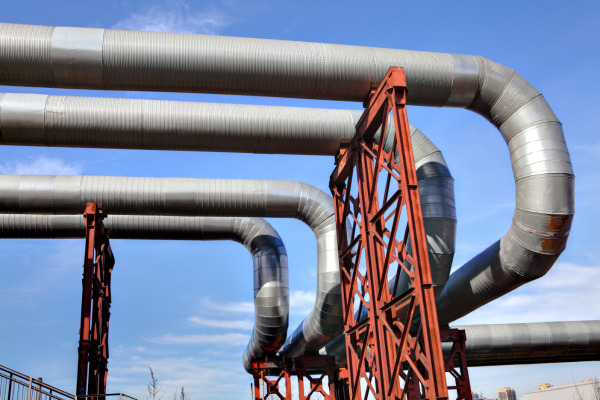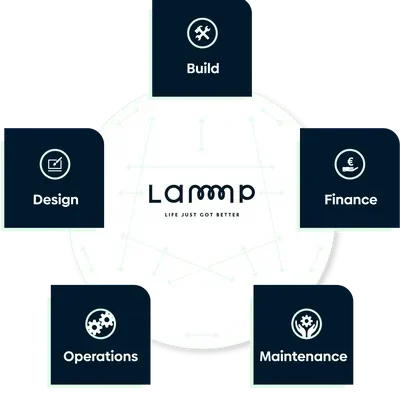Karno develops heating networks and also handles all upstream and downstream stages. Karno offers to manage a heating network project throughout its entire lifecycle. In this case, Karno operates in DBFMO. In this article, we explain why working in DBFMO is advantageous for a heating network project.
What is DBFMO?
The DBFMO process, an acronym for the English terms Design, Build, Finance, Maintain, and Operate, is an organizational model that groups together different activities related to the complete management of a project. In our case, the DBFMO procedure concisely describes all of Karno’s activities for the execution of a heating network project.
Design
In this first stage, Karno conducts the network’s feasibility study and is responsible for the project’s design. This process must address the project’s various technical, economic, and environmental challenges.
Build or Construction
After the project’s study and design, Karno is responsible for the construction of the infrastructure and the heating network as a whole, in coordination with other stakeholders.
Finance or Financing
Karno participates in the project’s financing by mobilizing its own resources and by seeking external assistance (public or private partners). It manages the project’s financial integrity throughout its entire lifecycle.
Maintain or Maintenance
Once the network is operational, Karno is responsible for the maintenance and upkeep of the infrastructure. It ensures the network’s sustainability and the optimal supply of thermal energy to buildings.
Operate or Operator
As a network operator, Karno ensures the proper functioning of the infrastructure and is responsible for network regulation.
What are the Advantages of Operating in DBFMO?
One might question the relevance of grouping all these activities within a single company. In fact, it is an organization that offers numerous advantages due to its structure. It presents three main advantages, which are detailed below:
- Simplicity for the client
- Performance derived from the integration of the different stages of the network’s lifecycle
- Well-aligned financial and environmental performance incentives
A Heating Network Project, Free from Complexity for the Client
Complex Management of the Heating Network
Karno enables a developer or other clients to benefit from heating network technology without the associated technical and administrative complexity. Indeed, the lifecycle of a heating network is more complex than that of a gas boiler. It requires:
- Conduct preliminary studies to verify the feasibility
- Choose an appropriate low-carbon technology
- Size the network according to heating and cooling demand
- Design the network and its boiler room
- Build the system within the overall construction site
- Perform maintenance throughout the lifecycle
- Operate and optimize the system to ensure its performance
- Invoice and perform the administrative follow-up for heat supply
These steps are specific and require varied expertise. Network development also represents a significant administrative burden, often with multiple stakeholders to manage. It is also a long-term operation, requiring the network to be operated and heat sold to end-users. For each of these stages, Belgium, which has an underdeveloped sector, offers few options.
Comprehensive Management of the Various Stages
With Karno, all these stages are handled. Karno integrates with design teams and manages all operations necessary for project construction. Long-term heat and cold supply is also covered. The client therefore no longer has to worry about heat supply once the project units are sold.
The client no longer has to worry about the complexity associated with the lifecycle of a heating network. Only the decision to install a decarbonized heating and cooling solution remains theirs. Once this decision is made, Karno takes charge of the network’s lifecycle.
Integration of Stages Beneficial for Network Performance
Integrating all stages of a network’s lifecycle with a single actor offers more than just simplicity benefits. It also allows for complete mastery of the solution. All decisions are made with full knowledge and acceptance of their downstream and upstream consequences. And, each stage helps improve other stages. It’s a virtuous cycle.
Better Performance through Network Operation
Network operation allows, for example, to precisely characterize the heat needs of end-customers. This knowledge enables the most adequate sizing of the network and its various components. Ultimately, this adequate sizing reduces the initial investment and improves system performance. Consequently, heating networks become more competitive both in terms of initial investment and operating costs.
Network operation also allows for a detailed analysis of system performance. This then enables a better definition of system evolution, both in terms of maintenance and equipment upgrades. These evolutions further increase system performance.
Network operation also allows Karno to refine and optimize heat generation technologies. This field feedback enables a better selection of installations upstream. Design offices are more likely to replicate less optimal choices without this field experience feedback.
Better System Knowledge
Upstream to downstream improvements are also applicable. For example, designing and building the network ensures Karno has perfect knowledge of the system. It can therefore operate it under the best conditions.
Furthermore, end-customers do not run the risk of not finding an operator. Indeed, an operator might be deterred by the idea of operating an unknown network with potentially poor performance. This new operator would then risk proposing prohibitive operating rates to ensure profitability.
With Karno, this risk does not exist.
Alignment of Economic and Environmental Performance
DBFMO offers an interesting structure for heating network projects. However, it exists in many forms.
At Karno, we don’t just operate in DBFMO. The business model is designed to drive the company to the best performance, both financial and environmental. This alignment of economic and ecological objectives in all its heating network projects is part of Karno’s DNA.
Karno, a 360-Degree Heating Network Developer
The DBFMO model, combined with a business model that aligns financial and ecological objectives, ensures Karno total and optimal management of the heating network. This DBFMO process, specific to Karno, offers process simplification for the client and better system knowledge and performance.
Do you wish to engage experts for end-to-end management of your heating network project?

